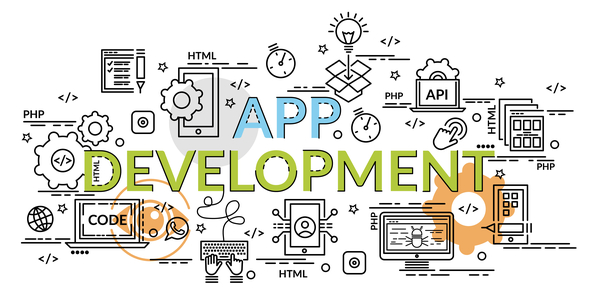Technology has taken some swift strides in recent times. One of the greatest innovations to become part and parcel of human lives is that of mobile applications. The growing abilities of smartphones have made it possible for individuals and businesses to incorporate smart decisions into everyday life. During the ongoing pandemic, mobile applications have played a significant role in keeping businesses open across industries. However, despite the growing popularity of mobile applications, the mobile app development industry has seen its share of troubles owing to the Covid-19 pandemic. It has been affected by the overall economic downturn just as much as other industries. Decreases in advertising and in-app purchases are also contributing significantly to the poor revenue collections.
The good news is that mobile app development will certainly experience massive growth in the post-pandemic world. As societies are shifting into a world of low-contact, digital services that can easily be accessed through the comfort of hand-held screens are gaining unprecedented popularity. Despite the effects of the pandemic, mobile app spending would see high growth in the coming days. As the coming days promise a steady rise in the usage of mobile applications, industrial stakeholders are working on the right moves to be well-prepared for the future.
The following discussion takes a look at how the mobile app development industry has been affected by the Covid-19 pandemic and the factors industrial leaders must consider while choosing the right mobile app developer in the future. We also discuss the growing presence of mobile apps in the digitalization of various major industries including retail, education, healthcare, and others.
Effects of the Covid-19 Pandemic on the Mobile App Development Industry

The pandemic has brought about several revelations about the mobile app development industry and its market structures. The weaknesses and disadvantages of traditional app development outsourcing models have been exposed, creating unrest and uncertainties in organizations that had been chiefly dependent on mobile applications for various processes of their business. Several companies have declined to outsource their app development processes owing to the poor faith in the vendor’s ability to mitigate the COVID-related risks. Additionally, there is a concern that most vendors will not be able to recuperate from the direct and indirect impacts of the pandemic on their operations. Some of the areas in which mobile app development services have been impacted most severely are discussed in broader detail below:
Impact on the Workforce
The remote work model was something that the world was not ready for. Setting up workstations at home has not been the easiest change that employees have been forced to undergo. As most employees do not have adequate facilities set-up in their homes, their ability to meet the standards of the organization and expected output quality has been severely impacted. Interrupted communication among teams has stifled the smoothness with which workforces are expected to perform. Since most app outsourcing services have not been well-prepared for such scenarios, the disgruntlement of the workforce is impacting the business in more ways than one.
Impact on the Workflow
In the past, mobile app development companies were chiefly run by the physical on-site presence of employees. Business continuity depended on manual app development processes carried out by outdated and legacy technologies. This assumption that developers and systems must be in one location to ensure continuity has been the chief roadblock to a smooth transition towards remote work systems. App development firms that lacked the foresight to shift from their manual to a digital ecosystem have been badly impacted by the interruptions brought about by the lockdown.
Impact on Strategy
Mobile app development strategies and planning that were previously adapted to conditions pre-dating the pandemic have now become obsolete. Consequently, the earlier established systems are not likely to guarantee growth and survival in the future. To rectify this lapse in foresight and survive the market flux, a drastic change in strategies has become an emergency for the industry leaders. Bearing in mind the dynamics of the post-COVID world, the app development industry must change gears and re-align its strategies in line with the changing needs of the market.
Stirring up the Competition
The pandemic has put further stress on mobile app developing companies to remain up to date with current trends and future likelihoods. As iOS/Android app development companies with an upper hand in technology are likely to serve their clients better, it’s a matter of concern for their competitors to remain relevant in the industry. This inside pressure is in many ways driving industry players to outdo themselves and put forth services that are more refined in quality. Another factor that demands focus is the reduction in operational overheads, which is one of the benefits of embracing digital methods of operations.
The Growth of Mobile Applications in the Post-COVID World

It has already been established that users spend more time on mobile applications than directly on the web. This has helped pave the path for mobile app development companies to serve their target market. The silver lining of the recent crisis has been the surge in mobile app usage as businesses are looking for digital ways to engage clients, continue with day-to-day processes, and increase their footprint. Some of the ways in which mobile applications are serving (and would continue to do so) the needs of every industry in this time of transition are elucidated below.
Shifting From In-person to Virtual Service Delivery
The necessity for social and physical distancing has mandated the set-up of remote work environments. This, in turn, has created a need to move in-person activities onto virtual platforms and these virtual services are likely to continue well after the virus abates. Although the driving force behind this shift will disappear someday, the concept of virtual service delivery is likely to remain in trend. Additionally, e-commerce and banking apps have also been of assistance in decreasing the need for physical contact while meeting the needs of individuals. Driven by the fears of the pandemic, the world has been quick to embrace the digital solutions of mobile apps. As the concept of self-service is here to stay, the usage of mobile applications is predicted to rise rapidly in the near future.
Staying on Top of the Technological Evolution
As providers of mobile app development services, Android and iOS app development companies are expected to remain up-to-date with the latest tools and technologies available in the market today. The following are some of the technologies that are becoming essential to a reliable mobile app development process.
- AI and ML: Almost every industry now demands the incorporation of artificial intelligence and machine learning capabilities in their applications. Such technologies are critical to developing insights for speed, scale, and convenience in mobile applications. AI can also help in amassing data from IoT, thus assisting in upgrading and enhancing products.
- Analytics: In-app analytics is a necessity for businesses to receive actionable insights to improve their performance on various platforms. Companies that don’t invest in analytics are not likely to remain in business for long as they will be working in the dark. By leveraging data analytics through mobile apps, businesses can make critical decisions and empower faster learning capabilities within the organization.
- Blockchain Technology: In the coming years, blockchain will very likely become a crucial part of mobile applications serving industries such as retail and e-commerce, finance, logistics, and others. In addition to having adequate aptitude in AI and ML, blockchain is another technological mountain that mobile app development companies must scale to remain in business with their clients in the future.
- Digital wallets: Another major innovation that has shaped the commercial landscape in the modern world is the mobile wallet. Mobile wallets have swiftly removed the dependency on hand-to-hand transactions, which is a very welcome change owing to the risk of contamination that is plaguing personal interactions. They have also eliminated the need for individuals to carry cash with them, thus addressing a painful inconvenience.
Industry-specific Mobile Applications

The global pandemic has underlined how mobile app developers serve a slew of other industries to keep their operations running even during desperate times. Some of the examples are listed below:
- Healthcare – One of the industries that Android and iOS application development services have been of great help to is the telemedicine industry. The ability of mobile applications to bridge the gap between healthcare practitioners and patients has been lauded as a revolutionary development in the advancement of healthcare services.
- Corporate Office Tools – The second most noticeable way in which mobile apps have been of service during the lockdown period is through conferencing tools. With the aid of the various video-conferencing applications, businesses have been able to keep operating and serving their customers. This has also helped people to develop a sense of socializing while distancing themselves from one another.
- Online Classes – Digital technologies such as video-conferencing platforms have been of great help to education institutions in conducting virtual classes and tests during the lockdown. By using mobile apps tailored to the education sector, academic institutions have been able to connect with students, guardians, and employees in vast numbers at the same time to ensure operations.
- Online Ordering System – The food and retail delivery markets are also experiencing high surges as most people like to shop for their needs using their smartphones. In addition to expanding the capabilities of existing online delivery services, it’s necessary to develop new mobile apps for small businesses wishing to shift to cloud store versions.
- Entertainment, Gaming, and Content Creation – The entertainment and Android/iOS game app development industry is experiencing further growth as people are spending more time devouring online content and engaging in virtual team sports. Today, most applications being designed for cross-platform availability to cater to a wider audience segment, and mobile app developers are the go-to players for that.
The Rising Need for Robust Security
As mobile apps get increasingly popular, it has become critical for Android and iOS mobile app development companies to incorporate stringent data security features into the apps. The rising vulnerabilities that hackers exploit to gain personal information of users must be taken into account when working on iOS and Android application development. In addition to the various platform security measures, the apps must be safeguarded with secure codes. Besides ensuring the security of the source code, data encryption is necessary to protect the information being transmitted. Rigorous testing of the app during the development phase can lead to the building of a robust app.
Long-term Maintenance and Preparation
As the pandemic has made the world aware of the sudden and unexpected turns that the global economy can take, it’s wise to take long-term precautionary measures to safeguard businesses in uncertain scenarios. This includes incorporating outsourcing services for non-core areas of businesses to ensure continued growth in the future. Businesses will seek the services of expert and experienced mobile app developers to aid them in these difficult times. To ensure that their services remain uninterrupted, vendors must strategize their business models to keep customers engaged in the long run. The options of fixed, hourly, or dedicated engagement models give clients flexibility while ensuring access to service. Apart from these existing models, newer engagement models are expected to arise as the needs of the industry shift.
Enhancements and Upgrades of Existing Apps
Market trends are dynamic, implying what seemed to work well for a population of end-users some time ago might not be effective in keeping them engaged anymore. This is the reason behind the continuous evolution and growth of the digital world. To continue providing services to the constantly evolving market, businesses and enterprises seek the help of mobile app development companies to upgrade their existing apps and platforms. A digital transformation is a constant requirement, which is why having access to a dedicated mobile app development team is desirable.
The majority of the app updates are not just about adding new features but also about improving the existing user interface. Partnering with an Android/iOS mobile app development company gives clients a competitive edge and helps them to maintain their brand image. The type and frequency of app updates are determined by the feedback received from the users on the app’s performance. Monitoring user feedback and identifying problems require a full understanding of the application – another reason why much is expected of mobile app development companies in the business world today.
Covid-19 Speeding up the 5G Race
Until a year ago, it was evident that the world needed faster connectivity. The ever-increasing dependency on the internet to run every device has driven the need for faster internet services at home as well as in the workplace. As the boundary between the home and workplace dissolved amid the Coivd-19 pandemic, the demand for faster connectivity has only increased. Large telecommunication companies are operating at full throttle to make this need a reality. Implementation of 5G goals is among the top agendas despite the impacts of the coronavirus. With faster connections in place, further adaptive changes will have to be made for the apps of the future. This drastic change will open up a whole new market for the mobile applications-based industry, thereby triggering the reliance on mobile app development companies even further.
Multiexperience Development is the Future of Mobile Apps
There is an increasing number of options through which users can access applications nowadays. These include augmented reality and wearable devices, among others. The frequency of user interaction is dramatically increased when such platforms are taken into account. The expansion of app development technologies has occurred to meet user and industry demands, and the result is the emergence of multiexperience development platforms. The technology behind multiexperience development is cloud-hosted artificial intelligence. The most common barrier to developing multi-experience services is the lack of alignment between the business’ needs and IT capabilities; the second most common being the shortcomings of developer skills. Both these barriers must be swiftly overcome by mobile app development services so that they can serve the evolving needs of their clients on multiple platforms.
Mobile Application Market Forecast
The mobile application market trends reveal some exciting developments in the industry. It’s expected that there would be an increase in the usage of wearable devices and the customer base of the e-commerce apps is also set to rise. Besides these major factors behind the growth of the market, there also exists the continuous growth in enterprise apps. There is also a lot of focus on apps that are used for monitoring health and fitness, especially in light of the pandemic. The increasing number of downloads and in-app purchases for gaming apps is also likely to continue contributing to the growth of the app development market.
Most organizations are investing large amounts of money in developing their own applications. But the cost of developing apps themselves is causing a lot of uncertainties in enterprises. The need for regular updates for the apps to function smoothly, combined with the need to develop apps that perform just as well on an iOS platform as they do on an Android platform, is causing enterprises to ally with the services of mobile app development companies. This allows them to reduce the time spent on app development and the overall cost of maintenance and skill development.
The mobile app development market had been predominantly made up of apps relating to gaming, productivity, entertainment, and social media. But of late, mobile applications have been useful in sectors such as banking, retail, transport, airlines, restaurants, education, health, and government services. The landscape of mobile app development is more competitive than ever before and the major players must keep investing in new technology and R&D to keep ahead of the game in the foreseeable future.
Understanding the Preparedness of App Developers

As discussed above, the mobile app development industry has been impacted in several ways by the Covid-19 pandemic. But as the need for organizations to collaborate and ally with mobile app developers is on the rise, enterprises must assess outsource service providers for their level of preparedness to handle any eventuality. The following a compilation of a few of the desirable practices that iOS and Android app development firms should incorporate into their services to attain a niche in the industry.
Best Development Practices for Building Sturdy Applications
The mobile application development sector is changing rapidly and so are its requirements. Meeting these requirements needs a steady and well-planned process that encompasses design, development, delivery, and deployment. Following the best practices of the industry ensures that app developers have robust systems in place that do not get deterred by interruptions such as the ones created by the recent lockdown. The following is an overview of some of the best practices followed by mobile app development services for assured success in the marketplace:
Design and Development
The prerequisite of creating a unique user experience is giving adequate time and thought to application design. The critical factors that developers must bear in mind when designing an app are the consistency of user interface design, ease of layout navigation, systematically structured workflows, and most importantly, compatibility with other applications across different platforms. The end product should an efficient application with high user engagement.
Models such as the lean startup approach are used for designing and launching applications using cost-effective ways. Creating a mock product and testing it for user feedback helps to incorporate the necessary changes. Designing non-native prototypes and developing applications that run on multiple platforms must all be considered during the development phase.
Application Analytics
The success of mobile applications fundamentally depends on user interaction, and this is why it’s important to include analytics features to track user interaction at any given time. Analyzing the chief indicators of the app’s performance makes it possible to enhance the product by using the right tools. App accessibility, engagement ability, customer retention, etc. can all provide insightful analytical information to developers. This knowledge enables businesses to fine-tune their applications to drive marketing changes.
Encryption, Authentication, and Malware Protection
The addition of on-device passwords and encryption of transmitted data are among the key practices to enforce authentication to protect the exchange of valuable data. Limiting the intrusion of malware though spam and blocking unauthorized access to other applications help to ensure that applications comply with security measures. Regular updates to screen out threats and the addition of security patches in subsequent upgrades are some of the services that mobile app developers can provide to enterprises for better security.
Integrated Strategy and Contingency Planning
Despite the challenges that recent times have brought forth, the digital world has swiftly leveraged its capabilities to build an easier way of living. Building on the existing leverage, it is possible for mobile app development services to use the information and tools at their disposal to create contingency plans to tackle adverse situations in the future. Strategies for preparedness should be incorporated into the workflow of the organizations so that the client can be more confident with the services offered by vendors.
Technology Expertise
As explained above, there are various new technologies and methodologies that mobile app developers are expected to master to be of service to their clients. Leveraging cloud-based technology where necessary, and incorporating AI an ML tools to provide a definitive edge to the application are some of the essentialities of app development that experienced all trusty mobile app developers should provide.
The Ability to Predict Market Trends and Take Pre-emptive Actions
The trends and forecasts discussed earlier illustrate a few of the scenarios that market leaders in mobile app development should prepare for. Service providers that can predict the emergence and impact of trends before they materialize have a definite edge over those who don’t. In the case of unwanted scenarios, such foresight protects companies from interruptions and compromises in service standards. In situations of surging demands, pre-emptive actions can help companies to cash in on the growing opportunities. Either way, it is better to collaborate with mobile app developers that are prepared for any scenario.
Well-established Workflow and Communication Strategy
As has been demonstrated by the pandemic, workflows within organizations are liable to be easily interrupted by unforeseen circumstances. This is enterprises should opt for external service providers that have efficient communication systems in place so that the client’s workflow does not get compromised. Mobile app developers, being experts in utilizing technology, are expected to have better communication systems in place that do not become easily overwhelmed under challenges.
Robust Development and Testing Process
Mobile apps must be tested rigorously using automated testing tools to ensure optimum outcomes. The development and testing teams must establish smooth collaboration so that the application functions desirably across all the required platforms. The development process must also involve reiterative and incremental design processes to improve the application. The quality of the application must be thoroughly ensured by following standardized testing and rating methods that ensure that the product is free of bugs.
Transparency and KPIs
In mobile app development, having a transparent end-to-end process promotes accountability of developers towards the progress of the project. The stakeholders get access to the bigger picture while the app is under development, helping them to be on the same page. Optimization of the product being developed can be achieved by having relevant key performance indicators (KPIs) in place. A measure of active users, frequency of visits, time spent on the app by users, etc. help developers to tweak the applications during the development phase as well as for future updates. Therefore, it’s important to have such well-defined features made available by app developers.
Concluding Thoughts
For consumer-centric businesses, mobile app development has become an absolute necessity. Mobile apps are no longer considered an extension of the physical business space since the virtual market is taking up the attention of the bulk of the customers. As smartphones and tablets have become indispensable parts of everyday life, mobile applications provide the right customer engagement that businesses need. Since the pandemic has forced our dependency on the usage of the internet, it’s prudent to leverage it to the advantage of businesses.
The path to incorporating mobile application development services is filled with options that demand careful considerations. In the crucial times brought around by the pandemic, it would be unwise to collaborate with a firm that cannot provide an uninterrupted flow of services, especially when the mobile app services sector is experiencing a surge in demand. Allying with the right native/cross-platform mobile app development service provider requires businesses to bear the above-listed considerations in mind. The right collaboration helps organizations to combat not just the challenges of the present but also empowers them to prepare for the uncertainties of the future.
Who We Are And Why You Can Count On Our Mobile App Development Expertise
GetSmartCoders is a mobile app development services company with a dedicated team of experts backed by the latest technology to deliver the exact requirements of clients. Our seasoned developers leverage their domain expertise and proven methodologies to build future-ready mobile applications. While developing applications is only part of the process, we provide end-to-end application and software services based on the client’s requirements. We also offer app maintenance and update services as a continuation of our support commitment. We follow industry best practices and adhere to high-quality standards to provide uninterrupted support even during the most difficult times.



